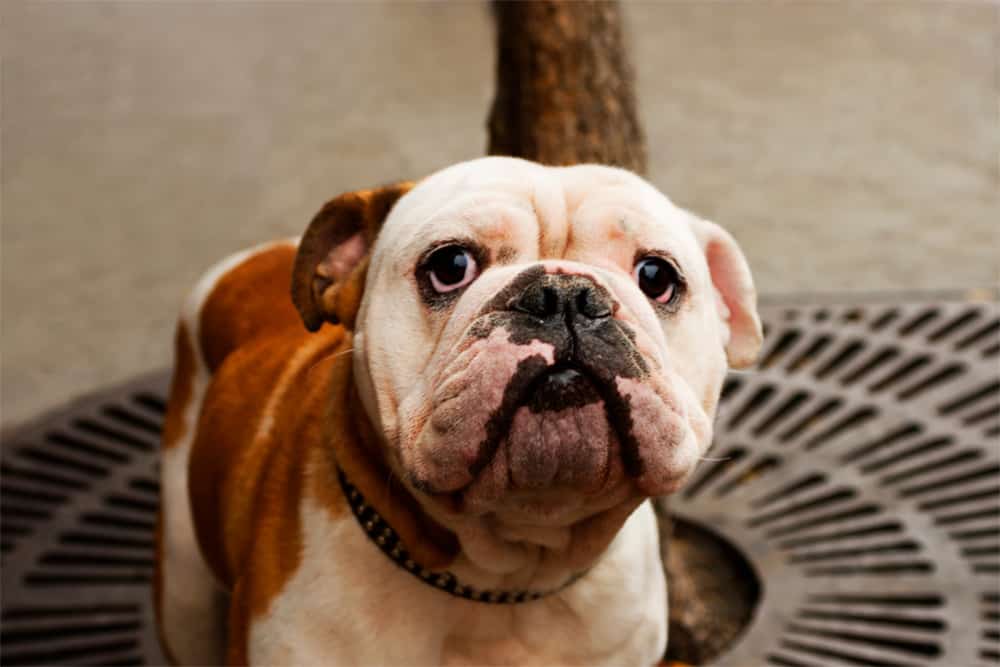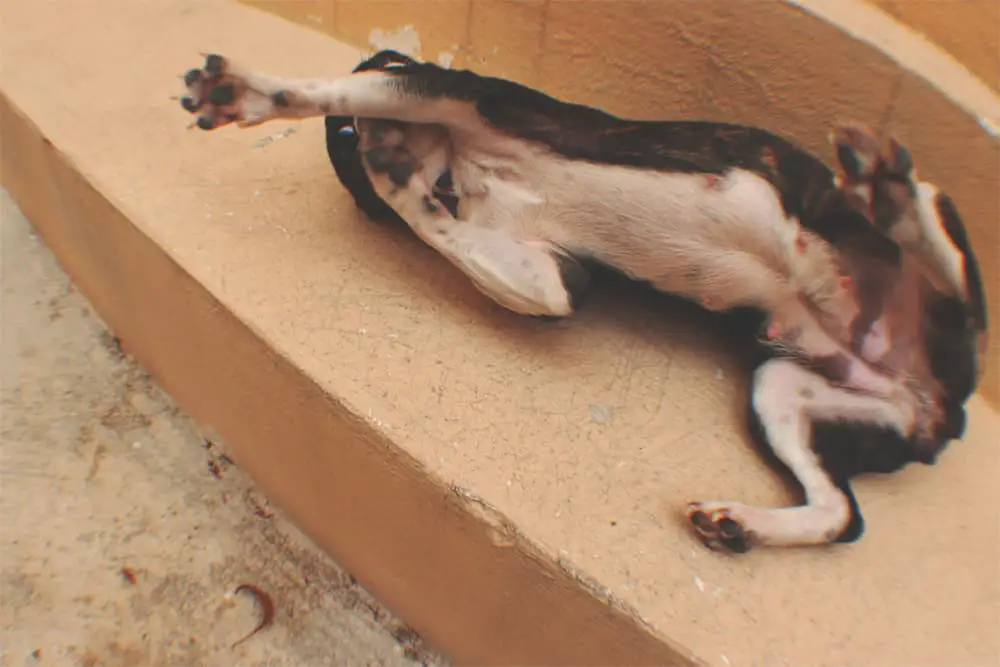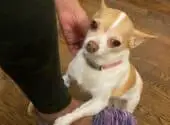Every dog must have his day – Jonathan Swift
Contents show
There are five certainties in life. Death, taxes, the inevitability that every light will turn red when you’re in a hurry, the certitude that coffee will always go cold far too quickly, and the inescapable truth that all dogs are weird.
The last of life’s five constants is the reason why most of us adore our faithful four-legged oddball friends, as their eccentricities and quirks make them who they are, and fill our days with endless mirth and fun.
The everyday weirdness that’s part and parcel of who our dogs are is something that we all grow accustomed to and fall in love with, but what happens when your best friend stops being his wonderfully kooky self and starts behaving in a way that’s, well, just plain weird?

What could be responsible for transforming your dog into a completely different canine, and why might he be acting out of character?
Dogs, like people, are complex creatures, and any, and all behavioral changes usually have a root cause.
And identifying why your dog has suddenly started acting weird is the first step on the journey to helping him rediscover who he was, and will be again.
That’s why we’re going to highlight and talk about some of the most probable reasons for the changes in your dog’s behavior, and what you can do to help him overcome whatever it was that turned his world upside down and inside out.
Separation Anxiety
Let’s start with the most obvious first, and the trauma that every pup parent will almost certainly become acquainted with at some point. Dogs are pack animals, and psychologically they need company.
If you leave your dog alone for too long, they’re likely to become destructive and increasingly vocal, both of which are symptoms of your dog’s fear of being abandoned.
Separation anxiety can also make your dog nervous and overly clingy, and have a lasting psychological impact on the way he interacts with you and other people. It is, however, simple to address.
You can either spend less time away from your dog or teach him that you’ll always come back by gradually increasing the amount of time that you spend away from him and rewarding him with positive attention and treats when you come back.
Spoiled Baby Syndrome
We all like to spoil our dogs and give them everything that we think that their furry little hearts desire, and while they’re getting their own way and being thoroughly indulged and are the center of our attention, they’re usually absolutely fine.
It’s when you take their treats and toys away that you might run into a few behavioral issues.
Dogs aren’t averse to behaving like spoiled toddlers in order to try and get their own way, and if your pup has started to become more demanding and belligerent, it could be because you’ve stopped indulging his every whim.
Never reward bad behavior by giving in to your dog and rather than punishing him for “acting out”, just ignore it and your dog will soon begin to understand the difference between acting like a petulant child and being a good boy, especially if you reward the latter while continuing to ignore the former.
Stress And Depression
Dogs are more like people than we give them credit for, and their mental health plays a big part in the way that they behave and interact with you and the world.
And stress and depression can wreak havoc on their lives and radically alter the way they behave in exactly the same way that they can and do with people.

If there has been a fundamental change in your, or your dog’s life, this can be a trigger that can lead to them becoming stressed or depressed, and in either of these situations.
It’s important to reassure and spend as much time with your dog as you possibly can if they start to seem like they’re off-color or aren’t as keen to play and go out for a walk as they usually are, you need to make sure your dog knows that he is as important to you as you are to him.
Positive reinforcement is key in this situation and natural stress and anxiety remedy can also help to alleviate your pup’s worries.
Routine
Remember what we said earlier about your dog showing the same sort of impulse control as a toddler? Well, that’s not the only thing that dogs and toddlers have in common, as they also both love and become hopelessly attached to routine.
Have you ever wondered why your dog seems to know when it’s dinner time or when they’re supposed to go out for a walk? It’s because they become used to, understand, and need routine in their lives.
If their routine changes because yours has to, it can alter the way your dog behaves and they can start to become more nervous or seem unsure about what’s happening and how they should interact with you.
Dogs are, however, infinitely adaptable and they should get used to the new schedule in a couple of weeks or so. Time is a great healer, and all your dog needs is a little patience and understanding and they should be back to their old self in next to no time.
Moving House
Did your dog’s odd behavior start when you moved house or coincide with a change in your living arrangements?
This isn’t unusual, as dogs are territorial animals and if their “territory” suddenly changes, and they find themselves living in a new place that they’re not used to, or don’t know, this can have a significant impact on the way that they behave.
Again, the only cure is time and allowing your dog to adjust to their new home at their own place and in their own time. They will get used to it, you’ll just need to be patient and give them the space that they need in order to do so.
Punishment Is Never A Good Idea
We get it, we really do. The world is an incredibly stressful place and just trying to get by and get on with your life can be difficult at the best of times, and sometimes we all end up snapping at members of our family.
And if your dog has been “naughty”, you might have shouted at him or chastised him a little too harshly, and that’s he’s probably sulking and being off with you.
Remember, your relationship with your dog is based on trust.
Him trusting you, and you trust him and if he feels like you’ve violated that relationship by shouting at him for a reason he doesn’t understand, you’ll need to convince him that he’s still your best boy by showering him in affection and positive reinforcement.
They get upset easily, but dogs are also incredibly quick to forgive, even if they don’t always forget.
Strange Sounds And Noise
Dogs can become upset by noise and any sounds that they’re not used to, and just because you can’t hear it, it doesn’t mean that they can’t.
If there are any new construction sites in the area, or you have new neighbors who your dog isn’t used to, the noise that just fades into the background for us, can be incredibly stressful for your dog.
If he’s become more vocal and has started barking more than he usually does or appears to be more worried and fretful, it could be because he’s responding to new sounds and noises in your neighborhood, so you’ll need to pay him more attention to reassure him that it’s nothing to worry about that he doesn’t need to worry, or be unduly concerned.
Over time, he should become used to any noises and begin to calm down with a little help from the person he trusts most in the world, you.
And Then Boredom Set In…
Dogs need exercise and mental and physical stimulation and if they’re not given enough of those things, it can wreak havoc on their mental wellbeing and when that happens, it can alter their behavioral patterns for the worse.

If your dog begins to act strangely, the first questions you should ask yourself are (a) Is my dog getting enough exercise and (b) Does he have enough toys, and do I interact enough with him enough to prevent him from becoming bored?
They’re both easy questions to answer, and problems to address, and providing you manage to ensure that your dog isn’t bored, the destructive and overexcited behavioral issues associated with boredom, shouldn’t become or should continue to be, an issue for your dog.
The Frighteners
Dogs can be easily scared and spooked and if something does panic them, it can drastically change their behavior.
It’s also easy to tell whether or not your dog’s odd behavior is triggered by something that frightens him, as it will only occur following a specific event, or when he is forced to interact with the “thing” that he’s frightened of, or by.
And there’s an easy solution to the problem. Either eliminate the thing that he’s scared of or help your boy to avoid it. If you remove the problem, your boy’s behavior should return to normal (or whatever normal is for him) incredibly quickly.
The Spite Of Others
Mistreatment, abuse, and maltreatment could be the reason for your dog’s sudden behavioral shift.
We’re not for a moment suggesting that you mistreat your dog, but some people, for whatever reason just don’t like dogs, and one of those people could be someone in you and your boy’s lives.
If your dog has started to act oddly and suddenly seems more submissive or timid than usual, it could be because someone you know is being mean to him, and if he doesn’t want to be around, or avoids someone, then the chances are that person and your dog have some sort of dispute.
There are two options, you can either discuss the potential issue with that person, or you can make sure that the person and your dog have no further contact.
Whichever avenue you choose to pursue, you do need to make sure that you adhere to it, as your dog will have demonstrated, in the only way he knows how, that it is a problem, and you will need to deal with it for him.
Injury And Illness
When a dog is ill or injured, pain can have a drastic effect on its personality. If your dog is more withdrawn and doesn’t want to spend as much time with you as he previously has done, it could be because he’s not feeling one hundred percent or there’s something wrong.
The best way to tell is to sit down with him and make a fuss of him. If there are any areas of his body that he doesn’t want you to touch, or he growls when you do attempt to stroke him there, then the likelihood is that the sudden change in his behavior is due to him being ill, or injured.
The best way to deal with this scenario is by taking him to the vet and explaining what you’ve discovered so that your dog can be examined, and treated properly
When To Act And What To Do
Finally, we’re going to address the question of when you should act and what you should do if your dog has started to act weird.
Firstly, attempt to identify what the root cause of the problem is and once you’ve done that, you can use our quick guide to help your boy begin to feel his old self again in next to no time.
However, if your dog’s behavior keeps getting weirder and worse for two weeks or more and you’ve already tried everything in our guide, it’s definitely worth taking him to see the vet as it could be a symptom of an underlying condition that needs to be located and treated.
It’s probably nothing, and with your help, your boy will bounce back in no time, but if the problem persists, it’s always better to be safe than sorry.




